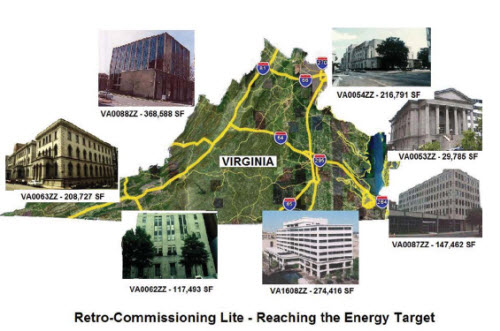Retro-Commissioning Lite is a limited commissioning process focused on resolving the known operational shortcomings of heating, ventilating, and air conditioning (HVAC) systems to get better system performance, improve tenant satisfaction, reduce energy consumption, and control costs. Retro-Commissioning Lite differs from the more traditional Re- Commissioning or Retro- Commissioning, in that the Lite concept considers most HVAC functions work well and generally only specific areas need focused attention. On the other hand, full scale Re-CommissioningIRetro- Commissioning have extensive requirements that look at the operation of every component of the HVAC system. This difference gives Retro-Commissioning Lite an advantage in meeting mandated energy goals quickly and cost effectively. However, the primary benefit is improved tenant satisfaction and occupant productivity witnessed by reduced complaints of poor thermal comfort and indoor air quality. After completing Retro-Commissioning Lite, many buildings obtain the added value of an ENERGY STAR rating (the rating means the building meets energy efficiency guidelines set by the Environmental Protection Agency and Department of Energy). The bronze Energy Star plaque provides both owners and tenants a positive sign of a well-managed building.
As a measure of the results of this unique approach, system performance improved along with a substantial reduction in energy consumption for the entire building inventory associated with the GSA Richmond Field office (of the Public Buildings Service’s Mid-Atlantic Region). The field office achieved a 35 percent aggregate energy reduction for seven buildings totaling approximately 1.4 million square feet when compared to the fiscal year (FY) 2003 baseline. (see photo) The Richmond Federal Building alone removed nearly 4,550 metric tons of greenhouse gas production in the last three years equaling the annual energy use of 400 family homes. The same strategies were applied between FY 2006 thru 2007 to three large Virginia facilities totaling approximately 700,000 square feet (SF) reducing their electrical usage by 1.175 million KWh (Kilowatt hour) and their natural gas consumption by 3.23 million cubic feet (32,000 therms (a therm is a unit of heat energy equal to 100,000 British thermal units or Btu)) for an additional 976 metric tons of greenhouse gas reduction. The deferred cost savings for this effort was $975,000 over the last three years.
|
|
Why use Retro-Commissioning Lite? The program is quick and effective in reducing energy costs and improving tenant satisfaction. The Lite program is substantially less expensive than traditional recommissioning. On recent solicitations bidding for both full commissioning and Lite commissioning, the bid results were $296.836 and $89,451 respectively. This added benefit allows more buildings to be repaired at lower costs, moving our buildings towards efficient operations.
Although the intent of Retro- Commissioning Lite is not to find and solve all HVAC issues, it does reduce building energy consumption to a true baseline. Retro- Commissioning Lite finds and corrects obvious HVAC problems that are consistently reported. These include dampers not connected, schedules overridden, equipment operating in hand (manual) mode, exhaust fans operating “24/7” (“24″ hours a day/”7” days a week), simultaneous heating and cooling and various other problems. The Lite concept fixes these problems, allowing the building to operate closer to the intended design. The implementation of Retro- Commissioning Lite offers GSA and other building owners the opportunity to move closer to our energy reduction targets while improving operations and controlling costs.
Contact:
Michael Sullivan
Mechanical Engineer
Public Buildings Service
Mid-Atlantic Region
U.S. General Services
Administration
michael.sullivan@gsa.gov





